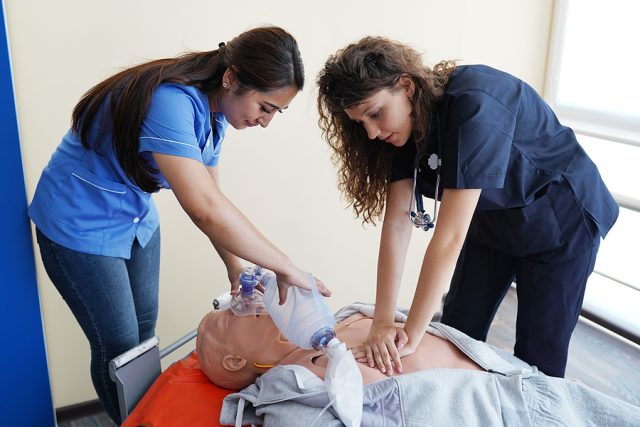CPR and first aid training are mandatory for many employees, but healthcare workers are often required to go beyond the basics.
Additional courses and training that saves lives include the Advanced Cardiac Life Support (ACLS) and the Basic Cardiac Life Support (BCLS) certifications.
Optimize Patient Care with BCLS & ACLS Certification

Both of these courses and certification programs are geared towards healthcare workers, and trainings build on one another. We’ll describe each course in detail to help you determine which one makes sense for you at this time.
Basic Cardiac Life Support (BCLS) Training
The BCLS courses take what you’ve learned in CPR training and add to it to optimize the level of support you offer patients or victims experiencing a cardiac episode.
NOTE: BCLS certification is a prerequisite for the ACLS certification course. You also have the option of enrolling in a BCLS + ACLS Combo certification if desired.
While anyone with a BCLS certification can apply what they’ve learned in an emergent public event, the course is geared to support professionals working in healthcare settings or where cardiac arrest is far more likely to occur.
During the course, we take a deeper dive into:
- CPR in healthcare or medically-oriented environments
- Improvement of chest compression fraction
- Realistic scenarios, simulations, and animations depicting rescuers, teams, and patients
- CPR, when administered as a team, is touched on in basic CPR but requires more emphasis for healthcare professionals
- AED instruction
- Additional medical support information such as administering oxygen masks, splinting breaks, and bleeding control
Who is qualified to take a BCLS training course?
First and foremost, students enrolling in a BCLS course must hold a current, valid CPR certification from a reputable organization such as the American Heart Association (AHA) or the Red Cross. While the course primarily orients towards healthcare professionals, we enroll students from a wide range of experience and occupations, including:
- Teachers
- Coaches
- Daycare providers
- Those who work in a higher-risk environment
- Adults who live with someone who is high-risk for cardiac arrest
How long do the courses take?
Our BCLS courses are conveniently scheduled on various days and times to accommodate any schedule. All study and training materials are provided and included with your initial registration fee. The classroom and hands-on training sessions take a total of four hours, after which you take your exam.
To successfully complete this course and receive a BCLS course completion eCard, students must:
- Participate in hands-on interactive demonstrations of high-quality CPR skills
- Pass the Adult CPR and AED Skills Test
- Pass the Infant CPR Skills Test
- Score at least 84% on the exam
How long does BCLS certification last?
All certifications are valid for two years, after which you can take a BCLS renewal course.
Advanced Cardiac Life Support (ACLS) Training
Our ACLS courses and certification build upon what you’ve learned in the BLCS training. Therefore, current, valid BLCS certification is a prerequisite for our ACLS certification program unless you enroll in a BCLS/ACLS Combo course. The emphasis in this course primarily focuses on the ability to provide continuous, high-quality CPR.
AHA-affiliated ACLS certification does this by focusing on:
- Basic life support skills, including effective chest compressions, use of a bag-mask device, and use of an AED
- Recognition and early management of respiratory and cardiac arrest
- Recognition and early management of peri-arrest conditions such as symptomatic bradycardia
- Airway management
- Related pharmacology
- Management of ACS and stroke
- Effective communication as a member and leader of a resuscitation team
Who is qualified to take an ACLS training course?
This course is designed specifically for healthcare professionals, particularly those who work in cardiac care environments and who are directly responsible for, or participate in, the management of cardiopulmonary arrest or other cardiovascular emergencies. It is also recommended for personnel working as emergency first-responders.
What materials do I need?
While our CPR and BCLS courses do not require additional course materials, professionals enrolled in the ACLS course must have their own copy of the 2020 Advanced Cardiac Life Support Manual. You may choose to purchase this through our website by clicking on the box to the right of the registration, or you can buy a copy online.
Before attending the training, we also ask that participants:
- Review ACLS Student Package
- Complete Precourse Self-Assessment
- Review and understand Cardiac Rhythms (ventricular fibrillation, ventricular tachycardia, PEA, asystole, bradycardia, high degree AV blocks, sinus bradycardia, sinus tachycardia, supraventricular tachycardia)
- Review ACLS Algorithms
- Review ACLS Pharmacology
Unlike most of our other certifications, there is no exam to pass at the end of this course. Instead, completing the course – including receipt of precourse self-assessment – is enough to receive your AHA ACLS Course Completion eCard.
How long does the course take?
ACLS certification courses are scheduled conveniently throughout the week, and most employers pay their employees to attend the class as part of their continuing education and training.
Due to the in-depth nature of the course, it is an all-day affair. We host the classes from 8:00 a.m. – 6:00 p.m., offering plenty of opportunities to stretch, hydrate, use the restroom, and get a snack. We also include time for a generous lunch break.
BCLS vs. ACLS – Decide Which Is Right For You & Get Certified Today!
Are you interested in taking your cardiac life-saving training and skillset to the next level? Our dedicated team at CPR Consultants is standing by. There’s never been a better time to get certified!
Get Started
